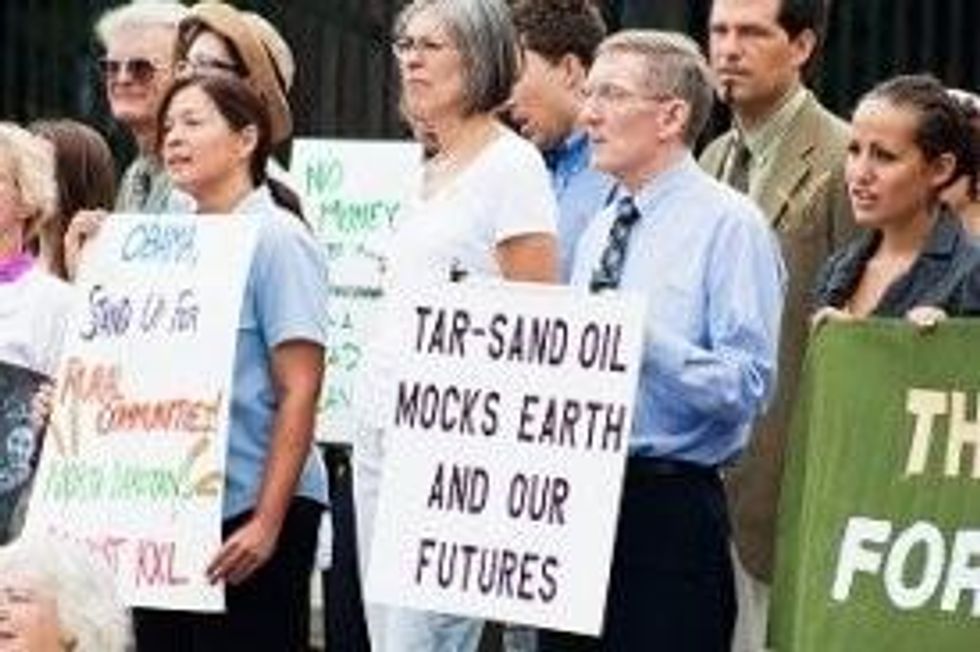President Obama now has a clear choice on climate change. Major energy corporations are seeking to build a 1700-mile oil pipeline from Canada's tar sands to refineries in Texas. The Keystone XL Pipeline would itself carry social and environmental costs: cutting through fragile ecosystems, creating risk of spills, and negatively affecting indigenous communities. But, most significantly, it would be a boon to efforts to exploit the tar sands.
The Canadian tar sands are a particularly dirty source of fossil fuels that could produce egregious carbon emissions. As Elizabeth Kolbert reported at the New Yorker:
[B]ecause tar-sands oil is so heavy, it has to be very heavily processed, which requires tremendous amounts of energy, usually in the form of natural gas. It's been estimated that, on what's known as a well-to-tank basis, tar-sands oil is responsible for eighty percent more greenhouse-gas emissions than ordinary crude.
Prominent climate scientist James Hansen has argued (in a now oft-quoted statement) that "if the tar sands are thrown into the mix, it is essentially game over" for the climate.
Before the end of the year, Obama's State Department must choose whether to approve or deny the pipeline project. To dramatize the president's choice, environmentalists have commenced two weeks of civil disobedience. On August 20 they began daily waves of sit-ins in front of the White House. As of this writing, near the end of week one, 322 people have been arrested.
Billed as the "biggest civil disobedience action in the environmental movement for many years," the two weeks of sit-ins and arrests in summer-recessed Washington, D.C., have thus far had difficulty in creating the tension that, at times, allows acts of civil disobedience to explode into mass public spectacles. The protests have not had a single, climactic date around which many thousands might mobilize. And since the deadline by which Obama must make his call is months away, administration officials have been able to drag their feet.
That said, the two weeks of action are creating many opportunities for press coverage of the issue. Protest leaders such as author Bill McKibben, who was arrested early on, have been using the ongoing actions as reason to make the rounds in the media.
The protests don't need to become front-page news in order for them to have an impact. McKibben correctly notes that the primary effect of this advocacy is to raise the stakes for Obama in terms of his support among his base in the environmental community. The fact that prominent individuals (McKibben, along with Hansen, Wendell Berry, Naomi Klein, Danny Glover, Gus Speth, Jane Hamsher, and others) have devoted their energies to highlighting this cause--and have rallied hundreds of others to make the sacrifices entailed in getting arrested while speaking out against the pipeline--has turned what might have been an easy-to-ignore bureaucratic decision into a line-in-the-sand issue for environmentalists.
Obama's credibility as a leader concerned about climate change is now publicly in question; he has the power to please corporate sponsors or environmentalists, but not both.
Whether the president will make the right choice given his recent track record is, shall we say, doubtful. If he did, Andrew Leonard pointed out at Salon, Republican opponents would no doubt paint him as a job killer insensitive to high gas prices. Nevertheless, the week of protest has helped to make clear what the right choice is. The actions in Washington have given trade unionists such as Joe Uehlein the opportunity to make the case that "'jobs vs. the environment' is a false choice." And, in a nice media coup for the arrestees, they gave the New York Times occasion to editorialize that the administration "should acknowledge the environmental risk of the pipeline and the larger damage caused by tar sands production and block the Keystone XL."
The protests point to an increasing militancy among climate change activists that has been developing steadily in recent years. All those concerned about the planet should very much hope that the tar sands pipeline is halted before it is ever approved. But if the project does go forward, it will not be the end for those organizing civil disobedience on this issue. Should pipeline construction be approved, it is not hard to imagine arrests involving much more than symbolic acts of protest. Instead of sit-ins at the White House, we may well see bodies before bulldozers on the Western plains.
